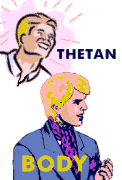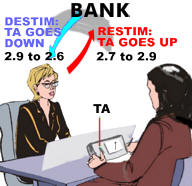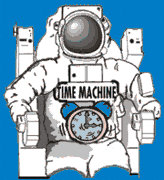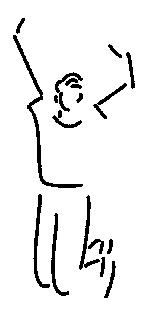Home Search Level 0 Level 1 Level 2 Level 3 Level 4 Level 4Pro Level 5 C/Sing Solo
| Tech terms | Scales | Axioms | Drills | Checksheets | Processes | Prep. lists | C/S terms | C/S tool | Grades | Cramm | Points | KTW | Online |
|
Home Search Level 0 Level 1 Level 2 Level 3 Level 4 Level 4Pro Level 5 C/Sing Solo |
|
|
| Tech terms | Scales | Axioms | Drills | Checksheets | Processes | Prep. lists | C/S terms | C/S tool | Grades | Cramm | Points | KTW | Online | |
The Recall
Int
Rundown
(End of Endless Int Repair RD)
 |
 |
|
| Happily exterior | Stuck in head - afraid | Urge to leave, headaches |
This is the full theory and RD of the Recall Int Remedy given on CT-3.
Note: This write-up applies to pc's not previously given an Int Rundown with Engram handling (Engrams Int RD). If the pc was run on Engrams connected with Int, (and now has out-int) that has to be repaired first. The full technique for that requires that the auditor and C/S are fully trained on Engram handling. As this is not yet covered and Engrams Int RD and repairs of that would only apply to a very small percentage of pc's it is only covered in passing.
"The Interiorization-Exteriorization Rundown" was first released in 1970. It resolved a problem that for years had troubled pc's and auditors. It had been a major goal of Scn to be able to exteriorize a pc from his body. That's the 'out of body experience' - the pc as a spirit moving out and seeing it all from above or whatever. The basic early theory was, that this would enable him to separate himself from a major source of aberration (his body) and enable him to straighten out his Bank on his own and get reoriented as a spiritual being. When exteriorization happened, pc's would routinely have major cognitions as they realized their spiritual nature. After all, this has been a major goal for many, many spiritual teachers and practices throughout the ages to do just that.
Buddhism, Francis of Assisi, remote viewing, theosophy, shamanism and countless others have all been into that. Ron Hubbard's technique for exteriorization was at the time (1950s) called "One Shot Clear". This was described in his book, "Dianetics® 55!" and elsewhere.
But this elated state could quickly be followed by all kinds of symptoms - from headaches, to fear or even terror, to claustrophobia ('afraid of going into things') to a general feeling of restimulation. This last could be seen on a Meter as a chronically high TA. "You couldn't get the pc out of his head, not even with a can opener after that", was the description at the time of the late 1950s.
 |
Exteriorization could lead to |
Symptoms of Out-Int: Headaches, odd body aches and pains. Effort, Pressures from environment. It can also be unwillingness to go into things, down to a physical back-off (claustrophobia). An urge to leave can also sometimes be traced back to Out-Int. The main symptom is high TA at session start or TA up at Examiner after EP at session end. Not all Out-Int cases suffer from high TA, but all who have high TA after lots of auditing should first of all be checked for having been audited past exterior.
It was thus found, that pc's in many cases (but not all) could be very difficult to audit after such an exteriorization had taken place. It was especially true after processes which tried to bring it about too quickly. To be exterior has been an age old goal of Man in his desire for spiritual freedom, so it was no wonder that it was pushed at the time. But due to the case problems it brought about it was abandoned as a usable technique and direct goal for processing. Since it is still a very fundamental cognition for any being to realize that he isn't his body, but a spiritual being, there was obviously something unresolved in the whole complexity of the situation. At the time (1956 and forward) it was kept under control by not going for the goal of exteriorization directly and if it happened, simply stop auditing the pc for a while. It also became clear that there wasn't any single button or one magic repetitive command that could bring about any desirable state of One Shot Clear.
 |
It takes lots of TA action to get to |
It was a dream, that was abandoned. It was realized that it took dozens of processes and it took TA action, TA action, TA action to get enough charge off a case so he honestly and with benefit for himself, could reach the state of Clear. But pc's were still going exterior in processing and it is still considered a big win. This can routinely happen as early as on Objective processes.
 |
Exteriorization is the act of |
Exteriorization
Let's define our terms. Exteriorization is defined as the act of moving out of the body with or without full perception. It is the fact of this act which proves that the individual is not a body but a spiritual being. Ron Hubbard was first able to bring this about through processing in 1952. It proved beyond any question the existence of the thetan, that the individual was a thetan, not a body. It disproved that Man was an animal or simply a body run by a brain. He was a spiritual being, timeless and deathless.
The Int Rundown
In 1970 a breakthrough was made. Ron Hubbard came up with a solution to the
symptoms sometimes caused by exteriorization. Two remedies or Rundowns were
developed and refined over the next number of years. His work on the matter was concluded in
1978.
The two Rundowns that came out of this are:
Engrams Int Rundown: This was the original Interiorization Rundown. (We call it Engrams Int RD). This RD uses Engram running with R3RA procedure, Engram running by Chains. It's use is however restricted, as became all use of Engram running after discoveries of 1981.
It was found, that people could go Clear on Engram running. This was of course great news, but it also meant, that one should not audit people on Engrams after this major state was attained.
Furthermore, Engram Clearing became a Grade after Grade 4. In other words you would not usually use Engram running before Grade 4 was completed and you would not use it after the pc went Clear. In reality that restricted the use of Engram running to a very small percentage of pc's outside the Engram Clearing level.
Recall Int Rundown: "The End of Endless Interiorization Repair RD" was the other Rundown. We call it "Recall Int RD". This Rundown uses only recall techniques to handle the matter. It was originally released as a remedy to handle sometimes recurring problems with Interiorization after the running of the above Engrams Int RD. Recall Int RD has however routinely become the first choice and has by far become the most used technique to handle the condition with.
This came about, as mentioned, because the use of Engram running became very limited and restricted after 1981.
The writings on exteriorization and Interiorization and
the handling of Out-Int were written up and collected into the Interiorization
Rundown Series. The present chapter is based on those papers.
In this chapter we cover the general theory of the subject and the exact
procedure of End of Endless Interiorization-Exteriorization Repair RD - or the
"Recall Int RD" for short.
Basic Theory
As described above it was known for a number of years that if you audited a
person after he exteriorized you would often get a high TA, a pc with Somatics,
headaches and an upset case.
Due to this it was considered better to simply stop to audit him for an extended
period of time after he had exteriorized. To audit him anyway was found to be
the main reason for such pc's having troubles.
This seemed a very tricky state of affairs. Persons who exteriorize on lower Grades still needed their upper
Grades. On the other hand, if you go ahead and
audit them it may mess them up. This placed a restriction on auditing; the
person would still have aberrations and Somatics, but the fact that he had exteriorized
would block the road.
Exteriorization
Exteriorization is the act of moving out of the body with or without
full perception.
It was this act which proved that the
individual is not a body but a spiritual being. It proved beyond any question
that a human being is basically a thetan, the individual is his own spiritual
self, not a body. It also disproved that Man was an animal or simply a body run
by a brain. He was a spiritual being, timeless and deathless.
Techniques had actually existed since 1952 on how to exteriorize a thetan. These
fell out of use because (a) a person, still aberrated and not Clear, would soon
return to his body and (b) when audited after that had trouble.
Exteriorization is a major problem a thetan sometimes has at death. "How do
I exteriorize?" He will make it eventually, of course, but he should be able to do that
without problems.
It also seemed illogical that a person would be hard to audit just because he
had exteriorized recently and then re-interiorized. Looking at the whole-track
of a thetan he has obviously done it over and over. The thetan leaving the body happened at every death.
And at every birth he went into and picked up a body and he must have gone through that millions of times
in his whole-track existence. So why should a recent exteriorization make him
hard to audit? Yet it did.
Engram Behavior
The answer to this riddle was gotten from reviewing some basics.
It was known from Engram running by Chains, that if you continue to only run the
last part of an incident (one which actually has an earlier beginning) the
situation does not resolve. If the earlier beginning is ignored the TA will go
up, meaning more mass is being restimulated.
 |
Unless you get to the very bottom |
The reason for this is, that you only can resolve a Chain completely by getting
the earlier incident or the earlier beginning. "Earlier" is where the
BPC will be found. That is where the seed that built up the charge was planted.
The tip of the roots. The earlier beginning of the incident was what held it in place - or possibly an
earlier incident.
Thus if you only ran the end of incidents you would get a high TA and no erasure
(As-is). If you only ran incidents late on a Chain of incidents you would get a
high TA. Pc's get uncomfortable, feel under pressure, when their TA is high
(above 3.5 and up).
If you don't erase incidents or Chains
of incidents when auditing (or at least key them out as in Recall release) you get a chronical
high TA.
From Auditors Rights you may remember, high TA is due to having been "overrun"
on something. That is however a simplified explanation. The truth is that a pc
with high TA has been run on something that didn't erase. The 'something' has an
earlier beginning that was not detected or there was an earlier incident. This
also happens in life. A person has Engrams on a certain subject. Simply by going
through living, new incidents and restimulations will happen and be added to a Chain
until something
is "overrun" or done too often. The TA, if it was checked, would be found to be
high.
The position of the TA shows mental mass. This mass shows
up by its electrical resistance. The Meter basically measures 'Ohms' (unit for
electrical resistance). It is a measurement for the trouble electricity has in
passing through something. The more resistance the more Ohms. This is seen on
the Meter by the TA reading high.
In other words, you can restimulate the end of an incident. If the beginning of
it is never touched then you will just accumulate more and more mass.

|
Before the Genie got into
the |
The Missed Beginning
What was happening here is, that there was a fascination with exteriorization.
As a result everybody concentrated on Exteriorization.
But the simple fact is: If one is in something, he must have gotten into it.
Therefore the beginning of an exteriorization is the Interiorization.
The being went into something
before he went out of it.
Exteriorization occurs at death. That's
an Engram. Interiorization occurs at birth, that's an Engram. So when somebody
goes exterior it is actually likely he keys-in having gone interior in the first
place.
That's the mechanism in play.
When you exteriorize somebody, or he exteriorizes
during auditing, he gets something restimulated at the same time. The earlier incidents and earlier
beginnings get restimulated. Without having addressed the earlier part of going
into the body
he is being put in the last part (exteriorization) of an incident which began
with Interiorization.
Not only are you touching on something
(exteriorization) late on a Chain which has millions of incidents earlier, you
are also touching on something which is late in the incident - the incident began
with Interiorization.
As you can see, there are two factors that both contribute to the TA to go high.
The Remedy
This is remedied by auditing out Interiorizations - meaning times the
person went in.
In doing the Int handling different wordings for 'going
in' are checked and handled for charge. These different wordings
are called the Int Buttons.
When all this charge connected with Interiorization is handled the pc can be
audited all he needs and wants after exteriorization.
Auditing out the Interiorization handles
it and restores the pc so he can be audited after a recent exteriorization.
This can be done either with the Engram Int RD -
using R3RA, Engram running by Chains. Engrams are run to 'Erasure' (As-is-ness of
basic incidents). This is the most permanent handling. But the problem is, the
use of R3RA is very restricted for technical reasons.
It can also be done with the Recall Int RD - using Recall processes and getting the
pc to a state of release on the subject. This is less permanent but usually
quite effective. Any future troubles that might show up are easy to handle as
you don't have to worry about repairing Engram running, but simply can handle
new restimulations with more recall.
More Data on Int
There are some further data which you should know about Out-Int and flows.
 |
Out-int is the stuck flow of |
Basically, Int is a pile-up of stuck flows and prior incidents. There is a stuck flow of keep going in, going in, going in. It is an obsessive mechanism. The pile of the pc's Int incidents on the track - especially the Engrams - make up a trigger mechanism which puts him into them. When you restimulate the incidents the Bank command is "Go in!". But It is really an energy flow. That it contains real energy can be seen on the high TA. These 'Earlier beginnings' must be audited out and be blown, before you're through with Int. Unless you do that the pc will still have that trigger mechanism there. Restimulate "in" and these earlier beginnings show up. The trigger itself is based on stuck flows being somewhat loosened up. You have a two directional flow working on him - he wants to get out. The Bank mechanism, when restimulated, puts him back in.
The stickiness doesn't show up until he suddenly gets blown out. The two flows will now work against each other. The "Go in" is like a solid rubber band that is getting stretched. There is a flow and a counter-flow working against each other. Originally they were frozen solid into a ridge. When you start to take that apart you can expect it to sizzle for a while. The ridge is somewhat like a traffic jam on a busy road. When it gets unstuck there is heavy traffic in both directions before the road is finally cleared. But to the pc it may be more like a rubber band pulling him back in. When all this is handled the rubber band effect is handled too.
Example: The way this mechanism works in auditing could be, a pc may blow out of his head with F/N, VGIs on Thursday. But he has not erased the basic on 'going in'. He went out on a 'reaction flow' (getting blown out) on Thursday. On Monday he comes in with his TA at 4.8. What has happened is the unstuck flow has triggered the opposite direction. He's now being dragged back in on a 'reaction flow' (going in). That is the rubber band effect.
If you just give him regular auditing he will plow in deeper. You see, he is still standing in the middle of a busy highway as far as Bank particles are concerned. All the traffic has to be handled before he is in the clear to go anywhere else. So you've got to handle his Int fully.
One reason we early on got so many Int repairs was, that
in many of these repair cases the pc never ran it deep enough. He could get a
key-out but not get the basic charge. You see, you have to run out the energy in
these flows - just by carrying on with the process long enough - of course.
In the early 1950s there was an exteriorization command which was "Try not
to be three feet back of your head," and it exteriorized people (a
"One shot Clear" command). But what
it did was simply unstick the flow and send the person out of his head. All too
often the counter-flow would put him back in and in a worse condition. He would be
really stuck in his head now. You're
likely to get the same result if you run Int Recall just to one F/N. You give
the command " Recall a time.... and boom, he's out, F/N VGI's. But he hasn't run
the energy out of it or run the basic incident on Int.
This is the mechanism that led to that it had to be handled repeatedly. It was
simply not run deep enough and there was still energy left to trigger him in one
or the other direction.
Time as a Stuck Flow
There is another phenomenon that can occur when running Int. Time itself can be
a stuck flow. You will run into a number of pc's who can't move back on the Time Track
more than minutes. They are 'stuck' on the stuck flow of time.
 |
Time itself can become a stuck |
Such a pc may F/N very quickly on a few recall commands. He may run shallow and only run a few Locks and get an F/N quickly. Then suddenly he hits the time machine button and goes way backtrack. The flow is reversed and he doesn't fire out of his head - he fires backwards on the Time Track. This is a reactive mechanism. And you'll have Out-Int repeating itself all over again. That's the rest of the mechanism. So you just have to know about these things and realize there is a certain amount of force of flows involved and it has to be worked out fully before all the frozen up energy is gone. It will eventually be audited out. You handle the incidents and you dissolve the obsessive stuck flow of going in, and you have the EP of Int.
The EP is not going exterior, but simply having no trouble with going into things.
 |
The most spectacular EP is
when |
A Spectacular EP
It can also happen, in some cases while auditing the
flow, that the whole phenomena gets unstuck enough to 'erase itself', so to
speak. It can be seen on the Meter as a big Blowdown of the Tone Arm and an F/Ning TA.
You have to keep moving the TA up and down to put the needle on 'Set'. This means that the whole stuck flow phenomena of Out-Int suddenly got unstuck and ran itself out in a matter of seconds.
Should that happen at any point you have hit the EP of the action and you would
end off right there. Thereafter, the pc will usually have no more trouble or
concern with Int.
The safest, when possible, is to enter the Int Rundown by running Engrams to begin with, and running only Engrams on the Int Rundown with R3RA. We had better run the Engram Chains and their basics out first and then, if repair is needed, repair them with Recalls, using the Recall Int RD. But due to the limited use of R3RA this is seldom possible.
More on Recalls
Running Int with Recalls has its liabilities. As you only run
to key-out you can't know for sure if you got it all. In the Recall Int RD this
problem is handled by the special way of assessing and rechecking for unhandled
charge. Then wait a week and check again.
But there are also definite advantages in using Recalls as the tool. You do not have to worry whether the pc
should or should not be run on Engrams for one reason or another. Any pc can be audited
by the Recall method as given here.
The Rundown was originally a repair process but it has proven itself to be the
most universal method of handling Out-Int. It can be run on Clears and above to
handle any Out-Int. It can also be used to handle Out-Int on pc's not educated in
or ready for Engram running.
The use of Recalls is also ideal in the handling of repair of Int, when it is necessary, after an Engrams Int Rundown has been done. The Recall Int Rundown gives the exact method for Assessment of the Int buttons and flows and running these with recalls as a repair action. And here we get a smooth run on the recall flows and the resolving of any Int troubles.
|
Home Search Level 0 Level 1 Level 2 Level 3 Level 4 Level 4Pro Level 5 C/Sing Solo |
|
|
| Tech terms | Scales | Axioms | Drills | Checksheets | Processes | Prep. lists | C/S terms | C/S tool | Grades | Cramm | Points | KTW | Online | |